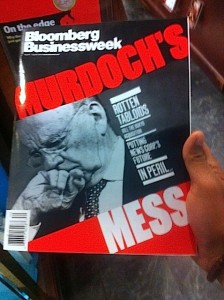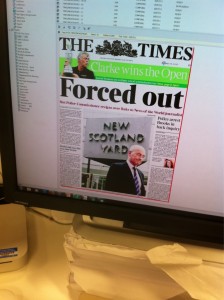

By Ray Pride Pride@moviecitynews.com
The Morning Hack: All The NewsCorp That’s Fit To Print
 DAVID CARR LEADS OFF his Monday “Media Equation“ column: “‘Bury your mistakes,’ Rupert Murdoch is fond of saying. But some mistakes don’t stay buried, no matter how much money you throw at them. Time and again in the United States and elsewhere, Mr. Murdoch’s News Corporation has used blunt force spending to skate past judgment, agreeing to payments to settle legal cases and, undoubtedly more important, silence its critics. In the case of News America Marketing, its obscure but profitable in-store and newspaper insert marketing business, the News Corporation has paid out about $655 million to make embarrassing charges of corporate espionage and anticompetitive behavior go away.” $655 million? Carr continues at the link, revealing where the head of that subsidiary wound up. (If you’re guessing atop the New York Post, you peeked.)
DAVID CARR LEADS OFF his Monday “Media Equation“ column: “‘Bury your mistakes,’ Rupert Murdoch is fond of saying. But some mistakes don’t stay buried, no matter how much money you throw at them. Time and again in the United States and elsewhere, Mr. Murdoch’s News Corporation has used blunt force spending to skate past judgment, agreeing to payments to settle legal cases and, undoubtedly more important, silence its critics. In the case of News America Marketing, its obscure but profitable in-store and newspaper insert marketing business, the News Corporation has paid out about $655 million to make embarrassing charges of corporate espionage and anticompetitive behavior go away.” $655 million? Carr continues at the link, revealing where the head of that subsidiary wound up. (If you’re guessing atop the New York Post, you peeked.)
The FT’s John Gapper thinks “Fleet Street is becoming a luxury for Murdoch.” In the Guardian, Charlie Brooker compares the unfurling saga to the end of John Carpenter’s They Live. (His casting suggestions for a BAFTA-bashing biopic don’t hold a wombat up to the 74-second “teaser” for “Hackgate: the Movie.”) Yahoo Finance lists the 25 major holders of NWS stock.
Ian Burrell at the Independent profiles “Team Murdoch,” the men coaching the 80-year-old mogul for his Tuesday morning seance before Parliament. Jay Rosen Storyfies reactions to how the assignment could affect Edelman PR’s brand. In an intensely dense infographic, Bloomberg Businessweek illustrates the phone-spying scandal’s reach. NYTimes has a more modest graphic connecting key players. The paper’s timeline graphic of the scandal’s turns is more ambitious. Prime Minister Cameron, in Africa, skips Rwanda and Sudan for an early return to deputize investigative commissions. The Independent’s political editor: How near does all the furore come to the doorstep of No. 10?
NewsCorp’s Wall Street Journal does its own cleaned-up tick-tock, taking special issue with the allegations of spying on 9/11 victims: “Casting some doubt over the claims, however, is the newspaper article they originated in. The Daily Mirror, a British paper, quoted an anonymous source saying an unidentified private investigator had been approached by unnamed journalists to provide phone numbers of the victims and details of the calls they had made and received in the days leading up to the terrorist attack… The Daily Mirror did not provide evidence for its claims and did not revisit them in its coverage on Friday. The story so far has not been substantiated by other news outlets.”
 “NEWS AND ITS CRITICS” is the modest pun from the Journal’s editorial board in its unsigned Monday leader: “When News Corp. and CEO Rupert Murdoch secured enough shares to buy Dow Jones & Co. four years ago, these columns welcomed our new owner and promised to stand by the same standards and principles we always had. That promise is worth repeating now that politicians and our competitors are using the phone-hacking years ago at a British corner of News Corp. to assail the Journal, and perhaps injure press freedom in general… We also trust that readers can see through the commercial and ideological motives of our competitor-critics. The Schadenfreude is so thick you can’t cut it with a chainsaw. Especially redolent are lectures about journalistic standards from publications that give Julian Assange and WikiLeaks their moral imprimatur. They want their readers to believe, based on no evidence, that the tabloid excesses of one publication somehow tarnish thousands of other News Corp. journalists across the world… We shudder to think what the Journal would look like today without the sale to News Corp…”
“NEWS AND ITS CRITICS” is the modest pun from the Journal’s editorial board in its unsigned Monday leader: “When News Corp. and CEO Rupert Murdoch secured enough shares to buy Dow Jones & Co. four years ago, these columns welcomed our new owner and promised to stand by the same standards and principles we always had. That promise is worth repeating now that politicians and our competitors are using the phone-hacking years ago at a British corner of News Corp. to assail the Journal, and perhaps injure press freedom in general… We also trust that readers can see through the commercial and ideological motives of our competitor-critics. The Schadenfreude is so thick you can’t cut it with a chainsaw. Especially redolent are lectures about journalistic standards from publications that give Julian Assange and WikiLeaks their moral imprimatur. They want their readers to believe, based on no evidence, that the tabloid excesses of one publication somehow tarnish thousands of other News Corp. journalists across the world… We shudder to think what the Journal would look like today without the sale to News Corp…”
PAIDCONTENT, “a wholly owned subsidiary of Guardian News & Media,” headlines the response as “WSJ To News Corp. Critics: STFU.” “The editorial in Monday’s Journal doesn’t use the term “shut the f* up” or quote Cee Lo Green but the 1,046 carefully chosen words are written for the choir and aimed squarely at News Corp. critics,” they write. “The gist: Don’t blame us; the Journal is better off out of the hands of the Bancrofts; not investigating hacking is worse than hacking; fear media regulation; the BBC; the Guardian and liberal politicians have their own agendas; and anyone who backs Wikileaks should look in the mirror. It is a masterpiece as far as defensive editorials go—and the Journal and its journalists would be better off if it had been spiked.”
The Washington Post editorializes, too, offering comfort to British hacks who spy: “Britain’s biggest media problem is not too much freedom but too little: Onerous libel laws deter critical reporting about public figures and arguably drive journalists to measures such as phone hacking to obtain lawsuit-proof stories.” Channel 4 has News International’s director of corporate affairs, Simon Greenberg, on phone hacking at the company:
In Newsweek’s long piece on the subject, London mayor Boris Johnson offers, “I’ve got no doubt that a good number of papers were engaged in identical practices to those of News of the World. The confected outrage about the intrusions that you’re reading in some newspapers that I won’t mention by name, except to say that they’re the Daily Mail—I’d be amazed if these papers weren’t engaged in similar practices. Including the Daily Mirror and maybe others as well.” AP reports: “Liberty Media chief John Malone, who engaged in media-mogul head butting with Murdoch over his stake in Murdoch’s News Corp… did not return a message seeking comment that was left with a spokeswoman. CNN founder Ted Turner, who once challenged Murdoch to a boxing match in Las Vegas, was unavailable, according to a spokesman. New York Daily News publisher Mort Zuckerman, whose newspaper fights every day for front page dominance with the Post for New York’s tabloid audience also did not return a message seeking comment.” The Nation‘s John Nichols claims NewsCorp has “gamed” American politics as much as it has the British system. Reuters talks to former News of the World employees about pressures of the newsroom under Rebekah Brooks and Andy Coulson.
TheWrap claims “[E]ven some in Murdoch’s elite circle of fellow multi-billionaires have deemed him kaput. ‘No one can take News Corp. away from Rupert,’ a member of that lofty strata told TheWrap, speaking on condition of anonymity. ‘But he’s dead money. He’s not going to rise again.'” Guardian: BSkyB directors to meet on £2bn payback to investors and James Murdoch’s role as chairman. Reuters: NewsCorp’s Australian shares drop 7% to two-year low.
Media pundit Jeff Jarvis stood tall on his tweetbox, too: “The Wall Street Journal is becoming Murdoch’s cheap harlot, publishing his ‘interview’ and ‘editorializing” his defense.’ Oh dear. A little later, he offered his own prescription for either the preservation or the detonation of NewsCorp’s newspaper holdings. Filmmaker Aaron Stewart-Ahn bowls a googly on Twitter: “Maybe Murdoch’s cunning plan is to have so many people arrested, resigned on daily basis everyone gets stunningly confused.” [Times of London front page preview tweeted by Jon Hill Design; Bloomberg Businessweek by Rafat Ali.]
“The Hack” is an occasional column of media commentary.















Ray, a word of personal thanks for your sterling curation of the News of the World headlines over the past two weeks or so. I was in Europe when the shit started hitting the fan, and the bigger stories in the German papers were the Women’s World Cup and the ongoing sovereign debt crisis extending to Italy (they were also still talking about DSK, for Christ’s sake).
Coming home and finding everything I needed to know all lined up on Movie City News was a treat, and reading each story as events unfolded was gripping.
Cinematic, even. Anyway, good work and thanks.